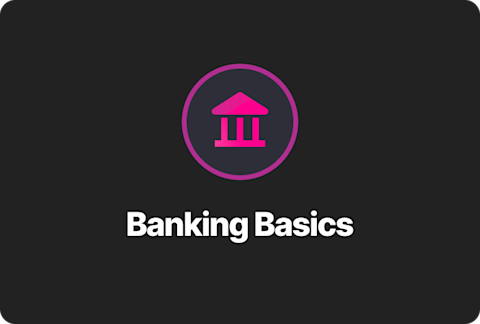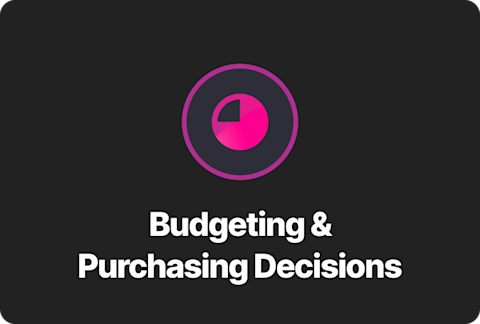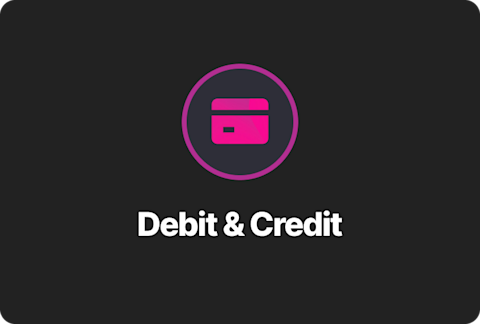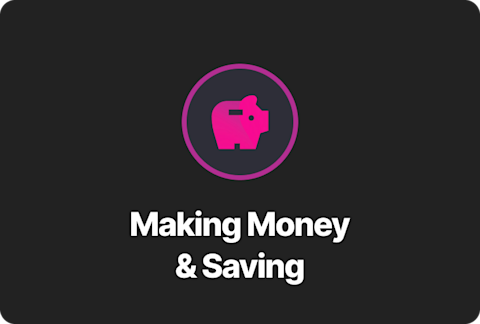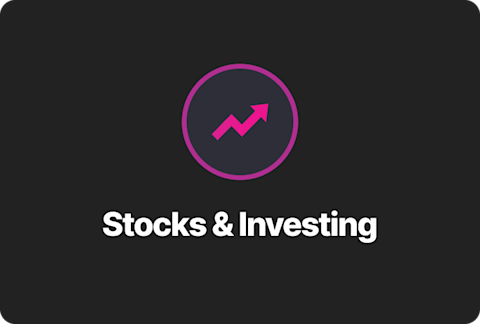Straight Answers To Your Top Money Questions

Navigating personal finance can feel like being stuck in a maze. 😵💫 From figuring out how to balance saving with covering your everyday expenses, to effectively managing debt, the questions seem endless – and these lessons are often not covered in school. That’s why we’ve compiled a list of 10 common finance questions, answered with honesty and simplicity, to help steer you in the right direction.
1. Is all debt bad?
Here’s the deal – not all debt is out to get you. In fact, some of it can actually be useful. The real trick? Knowing how to spot the good from the bad kind. 🧠
Good debt is the kind that can potentially increase your net worth or generate income over time. Consider student loans, for example. They’re an investment in your education, which can increase your earning potential. And then there’s a mortgage for a house, which is kind of like planting a seed that can grow in value over time.
On the flip side, bad debt is the kind that can drag you down. It can look like splurging on the latest smartphone with a high-interest credit card or taking a luxury vacation you can’t really afford. It doesn’t do you any favors and can quickly get out of hand, if you’re not careful. Getting the hang of spotting the difference between good and bad debt can be game changing for your financial health.
2. Why is a credit score important?
Think of a credit score like a financial GPA – it tells lenders how responsible you are with your money. 📚 It’s important because it affects practically every major money move you’ll want to make. Whether you’re planning to move out on your own or getting a car, your credit score is the key that can either unlock doors or keep them closed.
A higher score can mean better approval rates and lower interest rates, which means more money in your pocket. On the flip side, a lower score can mean having to spend more money in the form of high interest rates, or worse, getting denied for loans or credit cards altogether.
A good credit score might seem like a future-you problem, but now is the best time to lay the groundwork. Remember, Step helps you build positive credit history¹ just by making everyday purchases – and you don’t have to wait until you’re 18 to start!
3. How do I improve my credit score?
Establishing a credit score you're proud of can take time. 📈 If you’re working on your score, make it a priority to pay your bills on time — it's key! Set reminders or use auto-pay to stay on track. Consistent on-time payments can significantly help your credit score.
When aiming to boost your credit score, remember that it's best to keep your credit utilization rate below 30% across all cards. That means not maxing out all of your credit.
And here's a golden tip: hang on to those old credit cards or accounts. They help you lengthen your credit history, which is a good thing. However, don’t rush to open new accounts too quickly, as it can have negative effects. It's all about balance.
Step helps you build credit the worry-free way. It’s a secured credit card, so you don’t need to worry about spending more money than you have. And the best part? It comes with SmartPay, so your monthly bills are automatically paid on time, every time.
4. Why do prices of things change so much?
Ever wonder why the cost to fill up your tank of gas or your daily coffee fix seems to be on a never-ending rollercoaster ride? Prices can change for a number of reasons, including supply and demand.
Imagine this – every gamer on the planet wants the latest Playstation but there aren’t enough available. 👾 Naturally, the price might skyrocket because it’s so in-demand. On the other hand, picture a pile of last season’s Nike sneakers gathering dust because no one wants them anymore. Prices might plummet in an effort to get rid of them.
Other factors like the cost of making things, competition between companies, and changes in the economy can also influence prices. All of these together can lead to that fluctuating price tag.
5. What’s the difference between debit and credit again?
A debit card allows you to spend your own hard-earned cash, straight from your bank account. It prevents you from splurging on things with money you don’t actually have. 💳
An unsecured credit card provides you with a line of credit which you can borrow against, with the promise to pay it back later (and usually with interest). When used responsibly, they can be super handy for building credit.
A secured credit card (like Step) is like a regular credit card with a twist: your credit limit is determined by how much of your own money you put down. It’s especially cool because it helps you build credit and earn rewards, without the risk of racking up debt.
6. How do I create a budget I can actually stick to?
Step one is getting real with your finances by tracking your spending so you can see where your money goes. Categorize your expenses into needs (like rent and groceries), wants (like dining out and hobbies), and savings or debt repayment. Are you paying for subscriptions you forgot you even had? How many bubble teas are you really buying every week? 🧐
Then, the key is to set realistic goals for yourself. Budgeting isn’t about cutting out all the fun from your life. It’s about finding the right balance that allows you to enjoy the present and prepare for the future. If you love those bubble teas, find a way to pull back on other spending so you can budget for them, rather than cutting them out entirely. Check out these trending loud budgeting tips for more insights.
7. How do I start investing in stocks?
First things first, think about your financial goals and get familiar with how the stock market works. Are you saving for a big purchase, building a nest egg for retirement, or looking to generate passive income? Your goals will guide your investment strategy. 🌱
Next up, you need to open a brokerage account. Think of this as your ticket to the stock-buying universe. With Step, you can open one for free and invest with as little as $1. If you’re not 18 yet, you’ll need a parent or guardian to help set this up.
Once your account is set up, the fun begins! The best investors are usually the ones who do a lot of research and think long-term. They understand the stock market has its ups and downs, but remain patient, diversify their investments, and keep an eye on market trends. For more investing tips, check out this article.
8. Is renting really a waste of money?
Not necessarily. It’s true that home ownership has perks, like the potential to build equity and long-term wealth, but renting offers flexibility and freedom from expensive maintenance costs and property taxes. It can be a smart choice depending on your lifestyle, financial situation, and goals. It’s important to weigh the pros and cons of your situation before deciding whether to rent or buy. 🏡
9. How much money should I have in the bank?
The answer to this question really depends on your personal situation, but a good rule of thumb is to have 3-6 months’ worth of living expenses stashed away in a savings account for those “oh, snap!” moments – think car repairs or medical bills.
Beyond your emergency fund, it’s smart to save for specific goals, like chasing that college degree or getting your own place. 🤑 Finding a balance between covering your everyday costs, saving for short-term needs, and investing in your future might seem like an impossible task, but with a bit of practice, you’ll get the hang of it.
10. How do traditional banks make money?
Traditional banks make money by lending people money for mortgages or car loans, and collecting interest on those loans. So when you put money into a bank account, the bank lends it to their customers and charges them for borrowing it.
Banks also make money by charging fees. For example, they might charge you a fee just for keeping your account open, or if you accidentally spend more money than you have in your account, you might get hit with an overdraft fee. Those little charges here and there help the bank keep the lights on and running smoothly.
The bottom line
Don't be afraid to ask questions when it comes to money. More often than not, you're not the only one who has them! Whether it's figuring out the difference between good and bet debt, how your credit score impacts your future, or ways to save, knowledge is power. Lean on free financial tools like Step to help you along the way!




